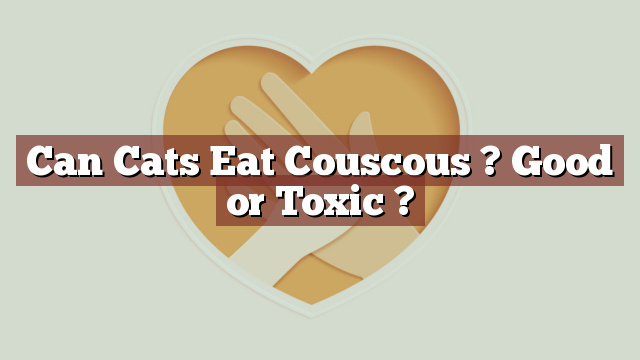Can Cats Eat Couscous? Good or Toxic?
As responsible pet owners, it is crucial to be aware of what foods are safe for our feline friends. While cats are obligate carnivores and require a diet primarily consisting of meat, it is natural for us to question whether they can safely consume other types of food. One common question that arises is whether cats can eat couscous. In this article, we will explore the nutritional value of couscous, discuss its safety and potential risks for cats, and provide guidance on what steps to take if your cat has consumed couscous.
Nutritional Value of Couscous: What Does it Offer to Cats?
Couscous is a small, granular pasta made from semolina, wheat, or barley. It is commonly used as a staple in North African and Middle Eastern cuisines. From a nutritional standpoint, couscous is a good source of carbohydrates, fiber, and certain essential vitamins and minerals. It contains small amounts of protein, fats, and some B vitamins.
Can Cats Eat Couscous? Exploring Safety and Toxicity.
While cats can derive some nutritional benefits from couscous, it is important to note that it is not a natural part of their diet. Cats can technically eat couscous, but it should not be a regular or significant part of their diet. Cats have specific dietary requirements that are best met through a balanced and complete diet formulated for their needs.
Potential Risks and Benefits of Couscous for Cats.
Couscous does not pose any immediate or acute toxic risks to cats. However, there are a few considerations to keep in mind. Firstly, cats are obligate carnivores, which means their bodies are designed to metabolize animal proteins efficiently. While they can digest and tolerate small amounts of carbohydrates, their digestive systems are not as well-equipped to break down grains like couscous.
Additionally, some cats may have allergies or sensitivities to grains, including wheat or barley present in couscous. These allergies can manifest in symptoms such as digestive issues, skin problems, or respiratory distress.
On the other hand, couscous can provide a small amount of additional fiber to a cat’s diet. This may be beneficial for cats with certain gastrointestinal issues or constipation. However, it is essential to consult with a veterinarian before introducing any new food into a cat’s diet, including couscous.
My Cat Ate Couscous, What Should I Do? Steps to Take.
If your cat has consumed a small amount of plain cooked couscous, there is generally no cause for immediate concern. However, if you notice any unusual symptoms such as vomiting, diarrhea, or changes in behavior, it is advisable to contact your veterinarian. They can offer guidance based on your cat’s specific health history and determine if any further action is necessary.
In Conclusion: Moderation is Key for Cats and Couscous.
While cats can technically eat couscous, it is not a necessary or recommended part of their diet. As obligate carnivores, they require a diet primarily consisting of high-quality animal proteins. Couscous should only be offered in moderation, if at all, and only after consulting with a veterinarian. It is always best to prioritize a balanced and complete diet that meets a cat’s specific nutritional needs.
Thank you for investing your time in exploring [page_title] on Can-Eat.org. Our goal is to provide readers like you with thorough and reliable information about various dietary topics. Each article, including [page_title], stems from diligent research and a passion for understanding the nuances of our food choices. We believe that knowledge is a vital step towards making informed and healthy decisions. However, while "[page_title]" sheds light on its specific topic, it's crucial to remember that everyone's body reacts differently to foods and dietary changes. What might be beneficial for one person could have different effects on another. Before you consider integrating suggestions or insights from "[page_title]" into your diet, it's always wise to consult with a nutritionist or healthcare professional. Their specialized knowledge ensures that you're making choices best suited to your individual health needs. As you navigate [page_title], be mindful of potential allergies, intolerances, or unique dietary requirements you may have. No singular article can capture the vast diversity of human health, and individualized guidance is invaluable. The content provided in [page_title] serves as a general guide. It is not, by any means, a substitute for personalized medical or nutritional advice. Your health should always be the top priority, and professional guidance is the best path forward. In your journey towards a balanced and nutritious lifestyle, we hope that [page_title] serves as a helpful stepping stone. Remember, informed decisions lead to healthier outcomes. Thank you for trusting Can-Eat.org. Continue exploring, learning, and prioritizing your health. Cheers to a well-informed and healthier future!

